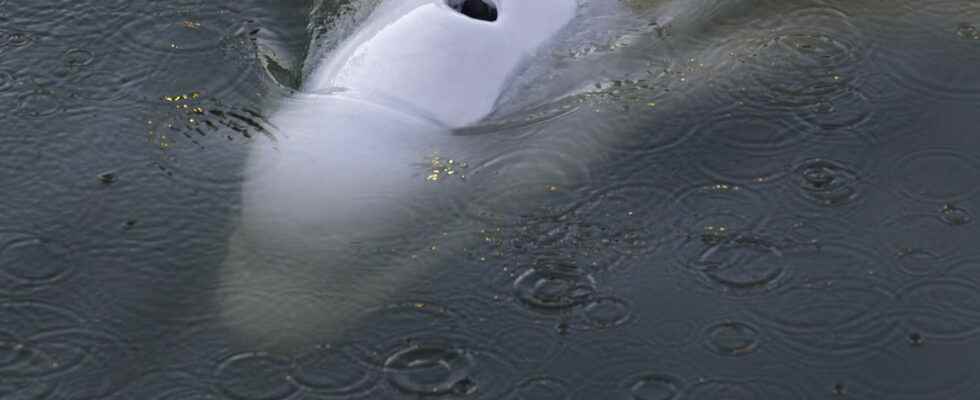BELUGA. It is this Tuesday, August 9 in the evening that the rescue operation of the beluga whale stuck in the Seine must take place. The operation, judged as that of the last chance for the survival of the animal, promises to be particularly complex.
[Mis à jour le 9 août 2022 à 15h52] It is a last-ditch operation worthy of the “Save Willy” saga which is looming in the Eure to try to save the beluga whale stuck in the Seine for several days. The authorities announced that the animal, stuck in a lock located in the Eure, 70 kilometers from Paris, would be moved on Tuesday with the aim of transporting it urgently to a salt water bath for a “period of care “.
The operation promises to be particularly delicate, first of all because of the weight (800 kg) and the size of the animal which measures more than 4 meters, its fragile state of health but also the topography of the place. The beluga has indeed been stuck for several days in the lock of Saint-Pierre-La-Garenne in the Eure, a narrow place which is not accessible by land vehicle. The equipment must therefore be transported to the site by hand. To help carry out the operation, members of the Marineland Antibes teams were expected on site.
The place of transport was not communicated but Lamya Essemlali, president of Sea Shepherd France had given some details this Tuesday to France 3 Regions. “Today’s major operation will consist in translocating the beluga, which is more than 150 km from the sea, to a salt water basin, better adapted to its physiology in order to benefit from medical surveillance and care. . It is a question of determining if the disease from which it is reached and which prevents it from feeding is something on which we can help it or if its disease is incurable”, she had slipped.
Later in the day on Tuesday, the Eure prefecture specified that the “transport operation of the beluga lost in the Seine” would be “attempted today in the evening”. The outlines of the operation have yet to be communicated but a press briefing is scheduled for 5:30 p.m. on Tuesday. The rescue operation should begin at 8 p.m. according to the prefecture, the beluga must then be transported by truck to an unknown destination. Upon arrival, the beluga should be immersed in a seawater bath.
The white cetacean, accustomed to cold salty waters, finds itself indeed far from its natural environment and its worried state of health. The animal was still not feeding on Tuesday morning despite the efforts of the keepers, but his condition did not seem to be deteriorating. Hence the possibility of emergency transport. “It seemed possible to us to think about transport to the sea,” said Monday during a press briefing the sub-prefect of Evreux, Isabelle Dorliat-Pouzet. “Veterinarians and researchers have indicated that in the interest of the animal, it can be tried. We are working hard on it.”
The rescue operation scheduled for Tuesday, August 9 should provide more information on the health of the beluga. The operation will indeed be supervised by many trainers who should take the opportunity to carry out numerous samples, analyzes and medical examinations on the cetacean. Monday August 8, the prefecture of Eure had indicated that “monitoring of the animal continues. The nautical means of the Sdis are engaged as well as the gendarmerie and the NGO Sea Shepherd. His breathing, his behavior and his food are observed.” So far, the beluga has not wanted to eat, while the keepers have given it trout, herring and squid. This is why he was administered an appetite stimulator, without success, as the president of Sea Shepherd France explained on Sunday on BFM TV: “What we hoped is that the appetite stimulator allows him to eat. There was no significant difference.” For several days, the veterinarians present on the spot have been trying to help him eat. Several fish were offered to the animal in vain.
In a press release published on Sunday August 7, the prefecture of Eure had indicated that in view of the physiological state of the cetacean, “vitamins and products likely to whet its appetite” were administered to it. Its presence in the Seine weakens the animal accustomed to evolving in a salt water environment, fresh water damaging its skin. If the beluga can be “resistant” in the words of the Eure prefecture, the lack of food leaves little hope for specialists and animal protection associations. “His lack of appetite is surely a symptom of something else, an origin that we do not know, an illness. He is undernourished and it dates back several weeks, even several months. At sea, he no longer ate “, notes Sea Shepherd’s Lamya Essemlali.
The beluga is still not feeding (a priori) but it continues to be curious. Around 4 am he rubbed himself for 30 minutes on the walls of the lock and got rid of the stains that had appeared on his back. Antibiotics may also have helped. pic.twitter.com/VIyZ9mWNN5
— Sea Shepherd France (@SeaShepherdFran) August 8, 2022
Spotted in the middle of last week, the 4-meter beluga has been in a lock northwest of Paris since Friday August 5. The lock located at Notre-Dame de la Garenne near Vernon, 70 km northwest of Paris, measures 125 meters by 25 meters. Its presence in this lock could have caused additional stress in the animal, the authorities noted this weekend. The possibility of transport was mentioned on Monday August 8 with a possible operation on Tuesday August 9.
